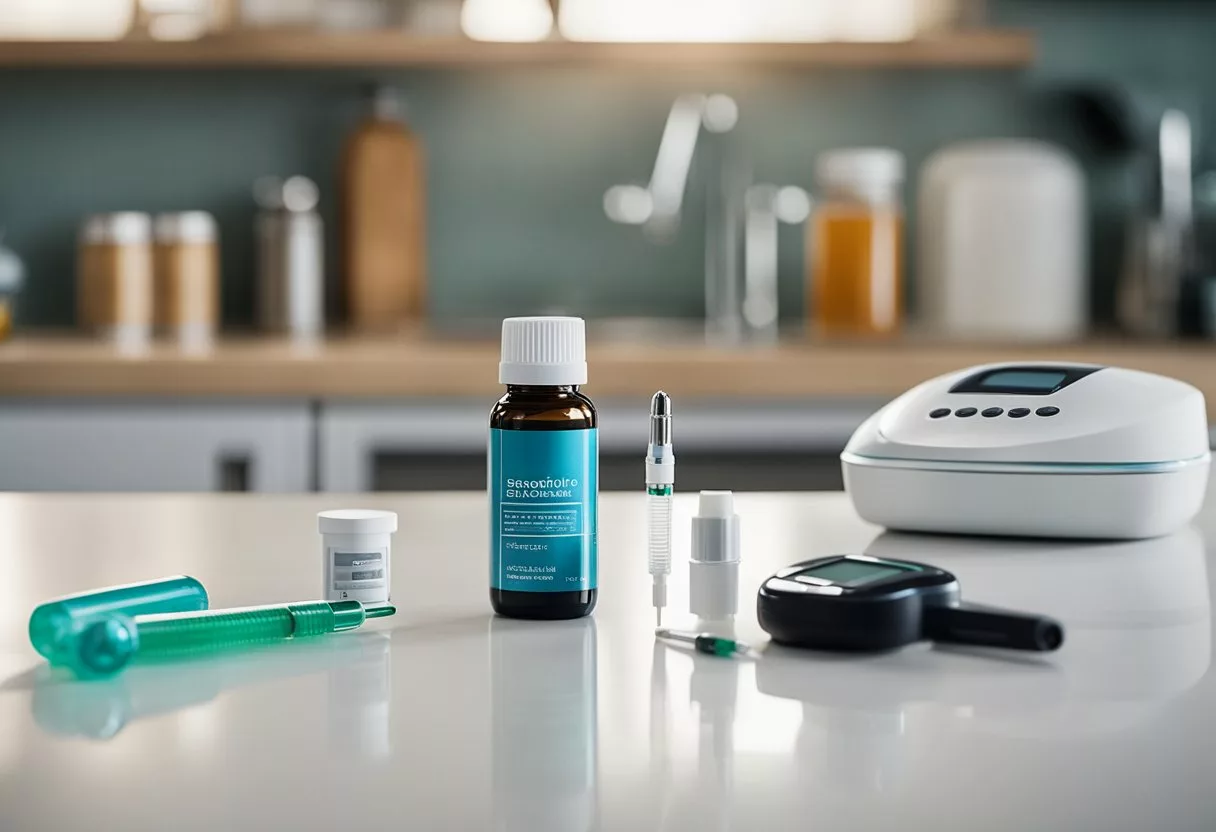Probiotics have gathered attention for their role in digestive health. Recent studies suggest they might also have a beneficial impact on individuals with diabetes.
The intricate relationship between the gut microbiome and the body’s glucose regulation mechanisms has sparked interest in the potential of probiotic supplements to aid in the management and prevention of diabetes. Probiotics are live microorganisms, found in certain foods and supplements, that can provide health benefits when consumed in adequate amounts.
In the context of diabetes, these beneficial bacteria may influence the body’s metabolic processes, potentially improving insulin sensitivity and glucose control. This has led to a growing exploration of which probiotic strains might be most effective for those living with diabetes.
With an array of probiotic products available on the market, it is important to choose ones that have clinical evidence to support their use in diabetes management.
Key Takeaways
- Probiotics may improve metabolic health, aiding in diabetes management.
- Selecting probiotic strains with clinical evidence is crucial for effectiveness.
- Probiotics should be integrated carefully into diabetes care plans.
Understanding Diabetes

Diabetes is a chronic medical condition characterized by elevated levels of blood sugar (glucose) which can lead to serious health problems if not managed effectively. The management of diabetes generally involves maintaining glycemic control and enhancing insulin sensitivity to normalize blood sugar levels.
Type 2 Diabetes Mellitus
Type 2 diabetes mellitus (T2DM) is the most prevalent form of diabetes and is often associated with insulin resistance. This occurs when cells in the body do not respond effectively to insulin, resulting in elevated blood glucose levels.
Unlike Type 1 diabetes, which is typically diagnosed earlier in life and involves an autoimmune destruction of insulin-producing cells, T2DM often develops over many years and is closely linked to lifestyle factors such as diet and exercise.
Blood Sugar and Insulin Resistance
A key issue in Type 2 diabetes is the disruption of glucose homeostasis, where the body struggles to maintain balanced blood sugar levels. When someone is insulin resistant, their body’s cells resist the action of insulin, which normally helps glucose enter cells for energy. This leads to hyperglycemia, or high blood sugar, which can become chronic if left unchecked.
Diabetes Management
The aim of diabetes management is to achieve optimal glycaemic control and prevent complications. This includes monitoring blood sugar levels, following a healthy diet, participating in regular physical activity, and sometimes taking medication or insulin therapy.
Recent studies suggest that specific probiotics may assist in managing T2DM by influencing glucose metabolism and enhancing insulin sensitivity.
Role of Probiotics in Diabetes
Probiotics play a crucial role in diabetes management by influencing gut microbiota, enhancing glycemic control, and impacting metabolic disorders.
Gut Microbiota and Diabetes
The gut microbiota is a complex community of microorganisms that has a profound impact on a person’s metabolism and overall metabolic health. In diabetes, dysbiosis, an imbalance in these microbial populations, can adversely affect blood glucose levels and insulin levels.
Probiotics, which are live microorganisms, have been shown to promote gut health and restore balance, potentially leading to improved diabetic outcomes.
Probiotic Supplements and Glycemic Control
Probiotic supplements specifically selected for their beneficial effects can assist in maintaining glycemic control. Clinical evidence suggests that certain probiotic bacteria, such as Akkermansia muciniphila, can reduce fasting blood glucose and HbA1C levels, a marker of long-term glucose control.
Furthermore, some studies also indicate that probiotics may lower inflammatory markers like hs-CRP, further supporting their role in diabetes management.
Impact on Metabolic Disorders
Probiotics are implicated in the broader context of metabolic disorders through their influence on the production of short-chain fatty acids like butyrate, which is known for its beneficial effects on insulin sensitivity and antioxidant status.
By modulating these metabolic pathways, probiotics may offer a complementary approach to traditional diabetes treatments, focusing not just on immediate glucose levels but also on the underlying metabolic disturbances associated with diabetes.
Choosing the Best Probiotics

Selecting the best probiotics for diabetes involves understanding the specific strains that offer health benefits and considering their efficacy as demonstrated by clinical trials.
Strains and Their Health Benefits
Lactobacillus Acidophilus: Beneficial for reducing fasting blood sugar and improving glycemic control in people with diabetes.
- Bifidobacterium Lactis: Aids in enhancing insulin sensitivity and potentially lowering the incidence of diabetes-related complications.
Lactobacillus Plantarum: Known to contribute to better blood sugar management and may help in modulating immunity.
- Lactobacillus Bulgaricus: While typically used in the fermentation of dairy products, its direct benefits for diabetes need more research.
Lactobacillus Casei: Research indicates a positive effect on blood glucose levels, making it a suitable candidate for diabetes care.
- Bifidobacterium Breve: Some evidence points to its role in reducing fat mass and improving metabolism, which are beneficial for diabetes management.
Lactobacillus Rhamnosus: Shown to impact gut health positively, but its direct effects on diabetic outcomes remain to be substantiated by further studies.
- Bifidobacterium Longum: Early studies suggest improvements in blood lipid profiles, which can be advantageous for heart health in diabetic patients.
Bifidobacterium Infantis and Lactobacillus Paracasei: Both contribute to a healthy gut microbiota, which is critical for overall metabolic health.
Efficacy Supported by Clinical Trials
Rigorous scientific studies, including randomized controlled trials, have established the efficacy of certain probiotic strains in diabetes management. Notable findings relate to:
- Bifidobacterium Lactis: Improved glycemic control.
- Lactobacillus Acidophilus: Benefits in lowering fasting blood sugar.
Clinical trials have provided compelling evidence of the role of probiotics in enhancing health benefits for individuals with diabetes. These trials, while varied in their design, consistently emphasize the importance of viable cells in sufficient quantities to confer the desired therapeutic effects.
It is critical that probiotics for diabetes are chosen based on clinical trials that confirm their beneficial impact on health outcomes specific to diabetes.
Probiotic Foods and Dietary Considerations

In managing diabetes, integrating probiotic foods into the diet can support gut health and potentially influence blood sugar levels. It’s important for individuals to select probiotic-rich foods that also align with their dietary needs for managing diabetes.
Fermented Foods and Diabetes
Fermented foods such as yogurt, kefir, kimchi, sauerkraut, and kombucha contain live cultures that may benefit gut health.
Particularly, yogurt and kefir, which are rich in protein and can have a stabilizing effect on blood sugar levels, are commonly recommended for those with diabetes. The consumption of these foods should be tailored to each individual’s dietary plan to ensure proper blood sugar management.
- Yogurt: Often chosen for its high-quality protein and live cultures.
- Kefir: A fermented milk drink that contains a diverse range of bacteria and yeast.
- Kimchi: A spicy Korean side dish made from fermented vegetables.
- Sauerkraut: Fermented cabbage that’s a traditional part of European cuisine.
Studies have shown that regular consumption of fermented foods can support the health of the pancreas and potentially improve diabetes outcomes. However, individuals should be aware of added sugars in commercial products, which could counteract these benefits.
Prebiotics and Synbiotics
To enhance the efficacy of probiotics, prebiotics and synbiotics are also important:
- Prebiotics are non-digestible fibers that help beneficial bacteria grow in the gut. They are found in foods such as:
- Garlic
- Onions
- Bananas
- Oats
- Apples
Incorporating fiber-rich prebiotics can support the overall dietary plan for diabetes by contributing to blood sugar level management.
- Synbiotics are combinations of probiotics and prebiotics that are synergistic, meaning they work together to enhance gut health. Consuming synbiotic foods or supplements can create an environment in the gut that maximizes the growth and function of beneficial bacteria.
When incorporating probiotic foods and prebiotics into the diet, people with diabetes should also consider their overall carbohydrate and sugar intake to maintain stable blood sugar levels. Variety in the diet, with an assortment of probiotic and prebiotic foods, can provide a comprehensive approach to dietary management of diabetes.
Integration into Diabetes Care

Integrating probiotics into diabetes care involves careful coordination with daily routines. This includes optimal probiotic timing, as well as consideration of interactions with medications and existing health conditions.
Probiotics may influence factors crucial in diabetes management such as insulin production, blood glucose levels, and overall metabolic health.
Daily Routines and Probiotic Timing
For individuals managing diabetes mellitus type 2, incorporating probiotics into daily life calls for a disciplined approach.
The timing of probiotic intake may affect their efficacy, particularly in relation to fasting blood glucose (FBG) and postprandial glucose levels.
Recent studies suggest that taking probiotics during or before a meal may enhance the persistence of the beneficial bacteria in the gastrointestinal tract. This can potentially improve insulin secretion and modulate blood sugar levels.
- Before meals: Ingestion of probiotics before meals may aid in stabilizing blood glucose levels.
- Consistency: Regular consumption of probiotics is associated with improved fasting plasma glucose and HbA1c levels.
Interaction with Medications and Health Conditions
The interaction between probiotics and diabetes medications like metformin should be discussed with healthcare providers.
Probiotics may have an effect on drug absorption or insulin response. For instance, certain strains can influence body mass index (BMI) and may indirectly alter the dosage requirements of diabetes medication due to changes in body weight.
- Medication absorption: Probiotics may interact with drugs, potentially affecting their absorption and efficacy.
- Comorbidities: Patients with comorbid conditions such as heart disease, high blood pressure, and elevated cholesterol levels should consult their healthcare provider. They need to understand how probiotics may impact these conditions.
Probiotics have been shown to influence triglyceride and total cholesterol levels, making them a possible adjunctive therapy in managing both diabetes and coronary heart disease risk.
Individuals with a history of antibiotic use, gestational diabetes, and conditions that affect gut health such as bloating or depression may also benefit from specific strains of probiotics.
Multistrain probiotics, in particular, have been associated with positive effects on fasting plasma glucose and LDL (low-density lipoprotein) cholesterol, which are important indicators in the management of macrovascular complications in diabetes. However, it is significant to note that research is ongoing, and awareness of the risk of bias in studies is essential. Always consult a healthcare provider before starting any new supplement regimen, especially when pregnant or managing obesity and other health challenges.
Safety and Potential Side Effects
When considering probiotics for managing diabetes, it’s crucial to understand the safety and potential side effects associated with their use.
Digestive Concerns
Probiotics are generally deemed safe, but they can lead to digestive issues such as bloating, gas, and diarrhea in some patients.
These symptoms often are mild and temporary. Yet, any new or worsening symptoms indicate that the patient should reassess their use of probiotics, particularly if these are linked to discomfort.
Immunocompromised Patients
Patients with compromised immune systems should exercise caution with probiotic use. This is because there is a potential for inflammation and chronic inflammation.
Live bacteria found in probiotics can sometimes cause systemic infections in those with weakened immunity. They should consult with their healthcare provider before commencing probiotic therapy.
Frequently Asked Questions

Probiotics may offer significant benefits for diabetes management. Accurate information about specific strains and their effects on blood sugar levels and insulin sensitivity can empower individuals with diabetes to make informed choices about their supplementary therapies.
What are the top recommended probiotics for managing type 2 diabetes?
For type 2 diabetes, strains like Lactobacillus acidophilus, Lactobacillus bulgaricus, and Bifidobacterium lactis have shown promise in supporting metabolic health and maintaining stable blood sugar levels.
How can probiotics affect insulin resistance, and which strains are most effective?
Probiotic strains such as Lactobacillus have demonstrated potential in enhancing insulin sensitivity.
Research suggests that they may help modulate the gut microbiota, thereby positively influencing glucose metabolism.
Are there specific probiotic supplements suitable for diabetic patients?
Yes, there are specialized probiotic supplements designed for individuals with diabetes. Probiotics with strains like Lactobacillus and Bifidobacterium can be particularly suitable due to their potential roles in glycemic control.
Can prebiotics and probiotics have a synergistic effect on diabetes control?
The combination of prebiotics and probiotics, often referred to as synbiotics, can have a synergistic effect on managing diabetes by enhancing the proliferation of beneficial gut bacteria and improving gut health, which is closely linked to metabolic functions.
What probiotics are suggested for individuals with type 1 diabetes?
Research on the best probiotics for type 1 diabetes is still ongoing, and while some strains may also be beneficial for type 1 diabetes, it is important to consult a healthcare professional before starting any new supplement.
What should be considered when choosing a probiotic to accompany metformin therapy?
When selecting a probiotic to take alongside metformin therapy, consider strains that can alleviate potential gastrointestinal side effects. Also, look for strains that support the gut microbiome. This is important because metformin can affect the gut microbiome.
